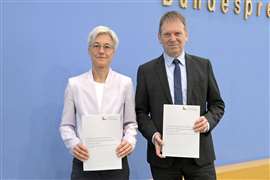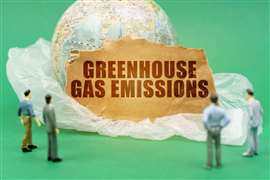Read this article in Français Deutsch Italiano Português Español
Revised German climate law aims to help transport sector shortcomings
16 April 2024
On April 15, Reuters reported that the parliamentary groups of Germany’s ruling coalition agreed to a more flexible climate protection law — one that gives flexibility to certain sectors in meeting emissions reduction targets while also ensuring the government will provide specific climate protection targets after 2030. The announcement coincided with the publication of Germany’s 2023 greenhouse gas (GHG) emissions report by the country’s Council of Experts on Climate Change (Expertenrat für Klimafragen, or ERK).
In April 2021, Germany’s Federal Constitutional Court announced that the country must tighten its climate protection law. According to the International Energy Agency (IEA), Germany amended its Federal Climate Change Act (Bundes-Klimaschutzgesetz) later that year, with new GHG emissions targets that include a 65 percent reduction by 2030 versus 1990 levels, at least an 88 percent reduction by 2040, and carbon neutrality by 2045.
According to the Reuters report, various industry sectors — such as energy, transport, industry and agriculture — were each expected to meet their own annual greenhouse emissions targets. If a sector missed a target, the minister responsible was expected to launch an immediate program to rectify the situation.
 Brigitte Knopf, deputy chair for Germany’s Council of Experts on Climate Change (Expertenrat für Klimafragen, or ERK) and Hans-Martin Henning, ERK chair, at the publication of the review report on the calculation of German greenhouse gas emissions for 2023. (Photo: IMAGO/Future Image via Reuters Connect)
Brigitte Knopf, deputy chair for Germany’s Council of Experts on Climate Change (Expertenrat für Klimafragen, or ERK) and Hans-Martin Henning, ERK chair, at the publication of the review report on the calculation of German greenhouse gas emissions for 2023. (Photo: IMAGO/Future Image via Reuters Connect)
In a press release, the ERK said the transport sector fell significantly short of its 2023 GHG target, by 12.8 metric tons of carbon dioxide (CO2) equivalent. It was the third consecutive year the sector failed to meet its targets.
With Germany’s transport sector consistently falling behind, Reuters said the pro-business Free Democratic Party (FDP), which leads the transport ministry, has pushed for changes in the law to allow leeway for sectors that could not meet their goals provided the national CO2 limits were met. Germany’s Transport Minister Volker Wissing warned last week that without approval of the proposed changes, his ministry would have to impose a driving ban on weekends to comply with the current rules, Reuters said, adding that Wissing said in a statement those bans were now off the table.
According to Economy Minister Robert Habeck, each sector’s annual emission quantities would remain the same for monitoring and evaluation, ensuring transparency, Reuters reported.
Some environmental groups said the changes were a setback, according to the Reuters report.
“Germany needs quick steps to reduce CO2 emissions in transport and to provide the automotive industry in particular with a clear framework for socio-ecological reform,” said Martin Kaiser, managing director of Greenpeace Germany, in a statement published on the organization’s website. “Otherwise, the government will miss its legal mandate to actually become climate neutral by 2045.”
In its report, the ERK said that overall 2023 GHG reductions in Germany across all sectors were significant and achieved overall targets. They dropped approximately 10 percent from 750 to 674 metric tons of CO2 equivalent. According to ERK, it was the highest single-year percentage reduction since 1990.
POWER SOURCING GUIDE
The trusted reference and buyer’s guide for 83 years
The original “desktop search engine,” guiding nearly 10,000 users in more than 90 countries it is the primary reference for specifications and details on all the components that go into engine systems.
Visit Now
STAY CONNECTED




Receive the information you need when you need it through our world-leading magazines, newsletters and daily briefings.
CONNECT WITH THE TEAM














